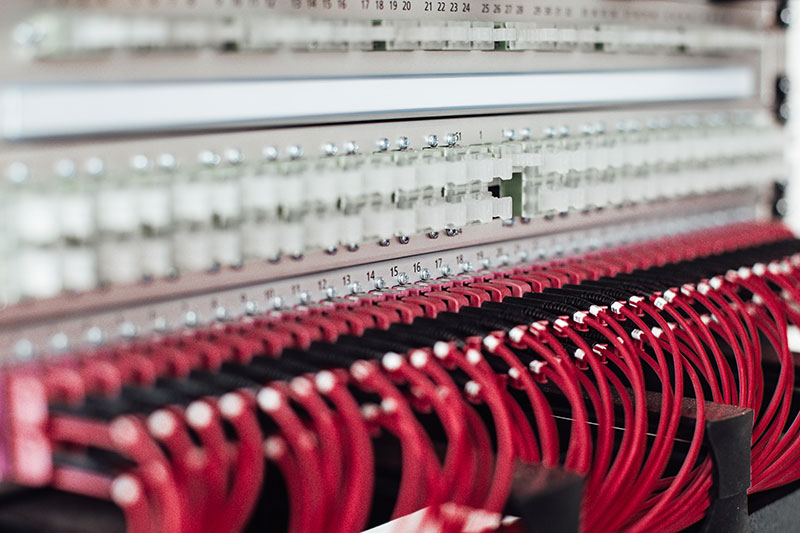What Separates Colocation and Data Centers?

Colocation and data centers are very similar since they both provide storage for your computing hardware, but there are differences between them. Understanding those differences will not only help you better decide which one you’d prefer to utilize but will also allow you to better understand what you’re reading when you need to perform research about your technology.
In this article, we’ll explain what data and colocation centers are and describe their benefits. There are a lot of benefits to cover for each kind of data center out there, so we’ll only touch on a few for simplicity’s sake.
Defining Colocation Centers
Colocation is when companies store their computing hardware, such as servers, in buildings owned by another company. One party will pay rent on the space they borrow, and the owner of the building will use that rent to cover the costs of the facility, from the main power and cooling bills to the backup power and cooling systems and security systems.
Some even provide extra services, such as onsite IT technicians. No matter what secondary offerings are available, you’ll likely always find colocation centers to be large, and they’ll have many tenants as a result.
Discovering The Benefits
There are quite a few benefits to colocation centers, such as being able to focus on running your business instead of managing your data center. There are other benefits as well, from the decreased cost to security and beyond.
While it may seem strange to say that colocation centers are cost-effective, consider the alternative. You’d need to either have a section of your current building or buy the land for and build a whole new building just for your hardware.
You’d also need to ensure it could meet your power needs, set up primary and backup cooling and power systems, install security measures and even hire security personnel, and more. The cost also goes up if you need to increase your scale, but your data center is too small for it. Colocation centers remove all of this hassle and charge a monthly rent instead.
Another benefit of colocation centers is their security. You are likely not the only tenant of the colocation center; depending on the size, some could have dozens of tenants. They don’t want your materials to be stolen, damaged, or otherwise tampered with, so the security of these buildings is tight.
If a problem should arise, they’d contact you as soon as possible and possibly even try to help you resolve the issue, especially if they have IT techs onsite.
Understanding Data Centers
Data centers are locations that house computing hardware—they may be facilities, buildings, or even just a room. There are also many different types of data centers, from enterprise to, yes, colocation centers. An enterprise center is one that is on your premises.
For example, if our building has a server room, then it is an enterprise data center. Because these centers are owned and run by the same business, all of the costs of operation, maintenance, upscaling, and more all fall on the owner’s shoulders.
There are also public cloud data centers, which could support anywhere between just a few dozen customers to hundreds or even thousands. Some popular and large public cloud centers include Amazon Web Services, Google Cloud Platform, and many more.
These kinds of centers own the hardware and the building housing it and charge customers for using the cloud services they provide. This allows for a wide range of uses, from running and owning websites to saving and storing data, all of which are vital.
While there are a few more types, we have yet to cover the benefits of the various data centers, so we’ll discuss a few more types in the next section.
Exploring Their Benefits
There are a number of benefits to data centers, and not just because of how broad that term is. We’ve already discussed the benefits of colocation centers, so we’ll focus on the other types here. Enterprise centers can be more expensive than other types of data centers, but they also come with their own range of benefits.
For one, everything is owned by you, making it easier for you to understand how everything in your center works, from the hardware itself to the power and cooling systems that keep that hardware working.
This also means that when work needs to be done, even if that requires the actual building or room to be renovated, not only do you know how it needs to be done but you can ensure that the work is done to your specifications. You can also ensure the security is handled how you prefer.
The type of data center we haven’t touched on yet are managed data centers. These are the opposite of enterprise centers: not only is the space the hardware resides in owned by a third party, but so is the hardware itself.
By utilizing these centers, you can be sure that the onsite IT techs are keeping your rented hardware working at peak efficiency while assisting you in preventing issues from even occurring. Increasing your scale in one of these centers is as easy as renting out a few more servers or other pieces of hardware.
The final data center we need to discuss the benefits of is the public cloud center. By utilizing one of these centers, you’ll be able to back up all of your data into secure systems and even host your own websites. Many of these services are popular and extremely prevalent, which means that if you run into an issue, you can either perform some research on your own or consult any IT technician and they’ll be able to help you achieve your goal or solve your issue.
The takeaway from this article is this: the term “data center” is broad and covers a wide range of different services pertaining to both the location where the hardware is being stored and the hardware itself. Colocation centers are a type of data center where you own the hardware but rent out the space in a building owned by another company.
Now that you understand the different types of data centers, you should be able to decide which type is best for your business.
- Avoid Spam Calls: Caller ID Apps Like Truecaller - May 19, 2024
- Streamline Data Access with JavaScript’s for-in Loop - May 19, 2024
- Master Your Build: Essential Java Build Tools - May 19, 2024








